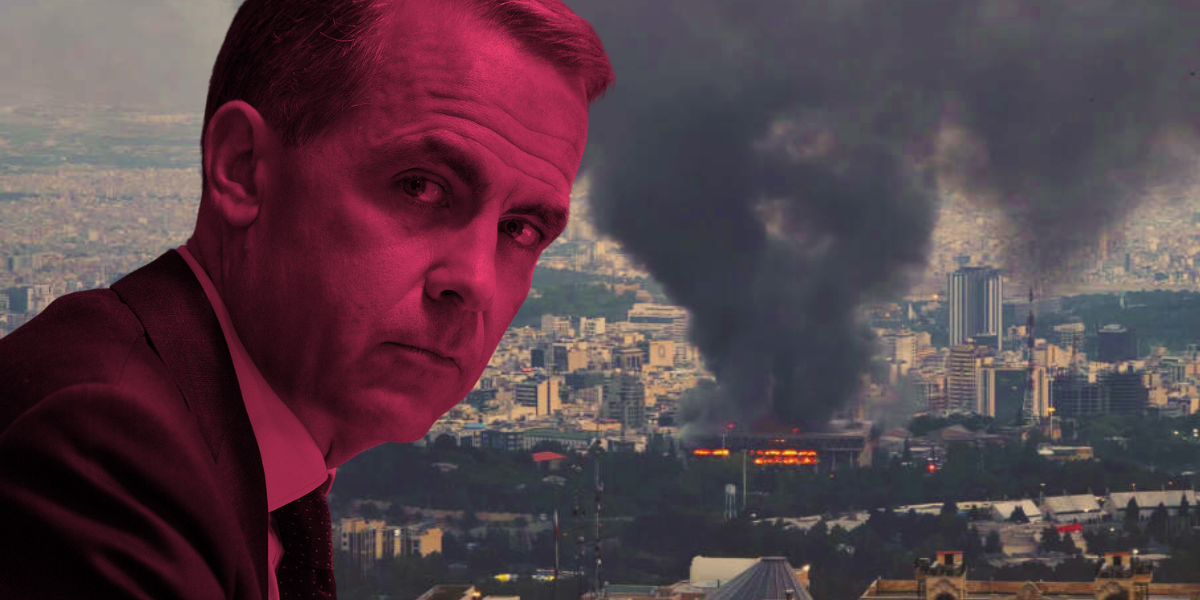On June 13, Israel launched its most significant attack on Iran to date, dropping over a hundred bombs on military and civilian targets across twelve provinces, from Tehran to Tabriz. It targeted nuclear sites, air defence systems, and the homes of IRGC commanders. The strikes on Tehran came just days before the final round of nuclear talks between the United States and Iran.
The Israeli government called it Operation Rising Lion. Iran called it what it is: war.
And Canada? Prime Minister Mark Carney called it “self-defence.”
That single phrase—posted in a tweet echoing U.S. messaging—offered a blank cheque for escalation. No mention of Gaza. No mention of the Iranian civilians killed in their homes. No mention of the diplomatic negotiations that were deliberately undercut. Just another recycled soundbite, designed to let one country act with impunity while another becomes a legitimate target.
Canada may not be leading this war. But it is complicit. And that complicity is precisely where our opposition must begin.
U.S. firepower, Israeli trigger
The war on Iran is hardly an isolated Israeli operation. It’s deeply entangled with U.S. power. Israel may have pulled the trigger, but the United States loaded the gun. The bombs dropped on Natanz were American-made. U.S. intelligence agencies shared targeting data. The Pentagon repositioned aircraft carriers and evacuated embassy staff and their families days before the assault. Washington was aware of what was coming and played a role in making it possible.
That does not mean the U.S. and Israel are perfectly aligned. There are real tensions within the U.S. establishment, notably as Washington prioritizes its military buildup in the Indo-Pacific region. But one point of unity remains: Israel must not be held accountable.
G7 leaders meeting in Alberta issued a communique backing Israel but failed to call for a ceasefire. Like Carney’s tweet, the G7 statement grants impunity to Israel, ignoring the preemptive nature of the strike, the scale of destruction, and the context of ongoing genocide in Gaza.
Collective punishment, from Gaza to Tehran
Israel’s message to Iran’s capital was chilling: it told civilians in Tehran to flee, warning that Israel maintained aerial control from western Iran to Tehran. U.S. President Donald Trump echoed the threat: “Everyone should immediately evacuate Tehran.” Without any warning or bomb shelters, terrified civilians are now scrambling to flee a city of 10 million.
Israel’s use of collective punishment in Iran mirrors the war crimes in Gaza. More than 55,000 people—primarily women and children—have lost their lives in a textbook application of the Dahiya doctrine: overwhelming, disproportionate force aimed at civilian infrastructure.
The Middle East sits on a knife’s edge. With Gaza under siege and Iran under attack, Israel’s unchecked aggression risks igniting a regional war that could draw in the United States. The USS Nimitz and Carl Vinson are now stationed in the Arabian Sea, supported by F-35 fighters, refuelling tankers, and missile systems. Washington calls this “defence,” but it looks a lot like war preparation.
While polls show that even Trump’s base rejects military intervention—and Iranian Americans overwhelmingly back diplomacy over destruction—American involvement appears imminent. Trump demands Iran’s total surrender and threatens to assassinate Ayatollah Khamenei.
Canada’s role in a global crisis
As of October 2024, the United States has provided at least $17.9 billion in military aid to Israel. Despite pledging to freeze new permits in January 2024, Canada approved over $28.5 million in military exports under existing licenses. Carney’s government refuses to act: no condemnation, no arms embargo, no comprehensive sanctions against an apartheid state.
Meanwhile, Canada is set to increase its military spending, with projected investments reaching $9 billion for 2025–26. This is a foreign policy that is militarized, U.S.-aligned, and focused on reinforcing Western power through force.
Governments that back war abroad impose austerity at home, gutting housing, education, and healthcare.
The stakes couldn’t be higher
That’s why the fight against war must begin where we are. It will require a mass movement—rooted in labour, student, migrant, and community organizing—to end Canadian complicity. We need to link the struggle against war abroad to the struggles against austerity, racism, and colonial violence at home.
We can stop the war by stopping it here—by making it politically impossible for our government to support, fund, or join it.
Join the “Hands Off Iran” rally in Toronto this Sunday, June 22nd at 4pm outside the US Consulate (360 University Ave).
Did you like this article? Help us produce more like it by donating $1, $2, or $5. Donate

